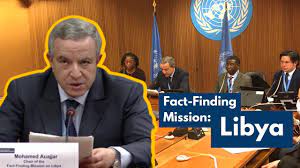
Fears of imminent Mass Executions
Human Rights Solidarity obtained from confidential sources unjust rulings issued by the Military Court in Benghazi against a group of prisoners, including minors. The number of those sentenced is 25 citizens, 7 of whom were sentenced to a final, non-appealable death sentence, while various rulings were issued against the rest.
The military court, established in accordance with Law[1] (4) of 2017 issued by the House of Representatives in Tobruk, is considered a special court, in violation of Article (32) of the Constitutional Declaration[2], which prohibits special courts. It also violates Article (1) of Law[3] (11) of 2013, for several considerations, the most fundamental of which is the trials of civilians before Military Courts[4], and the constitutionality of the amendment itself, Law (4) of 2017, is challenged in case before the Constitutional Chamber of the Supreme Court.
These trials lack the basics of a fair trial for violating Libyan law and the basic human rights stipulated in international agreements and treaties ratified by the Libyan state. Article (10) of the Universal Declaration of Human Rights[5] states “Everyone is entitled in full equality to a fair and public hearing by an independent and impartial tribunal, in the determination of his rights and obligations and of any criminal charge against him”. According to the International Covenant on Civil and Political Rights[6], the right to a fair trial is considered one of the standards of international human rights law, which aims to protect individuals from infringement or derogation or deprivation of their rights, article (14) states “… everyone shall be entitled to a fair and public hearing by a competent, independent and impartial tribunal established by law.”
Detainees who have been sentenced, or are awaiting their turn to appear before this special court, were forcibly disappeared for long periods of more than a year in complete isolation from the outside world, were subjected to consistent torture, confessions extracted under duress by physical and psychological torture were used against them in the trials, they were only able to meet with their lawyers during the court’s sessions, their families were unable to visit with them, and they did not receive the rulings formally, as the court insists on keeping the judgments confidential. The hearings were closed and not public, according to a reliable source. The judges were subjected to rebuke by the Chief of Staff of Haftar’s self-styled army, Abdul Razeq Al-Nadhuri, because they ordered the release a defendant[7] after they concluded that there was no evidence to incriminate him, saying “these are ISIS, how could you release them!”
All of these aforementioned points make the rulings issued by this summary court void.
Therefore, Human Rights Solidarity calls for stopping the implementation of any judgment rendered by this military court, and demand ending the trial of civilians before military courts. Those suspected of having committed any offense should before a fair and impartial court.
Human Rights Solidarity also deplores the stance of the United Nations Support Mission in Libya (UNSMIL) regarding these unfair trials and holds it responsible for not taking a serious position on these violations of International Human Rights Law. UNSMIL remained silent, despite numerous appeals.
Human Rights Solidarity
Tripoli – Libya
[1] House of Representatives in the Transitional Period: “Law No. (4) of 2017 amending some provisions of the Military Penal Code and Military Procedures Code”, 28 November 2017.
[2] “Establishing Special Courts is prohibited”, Paragraph (2)2 Article (32) of the Constitutional Declaration, adopted by the National Transitional Council, 3rd August 2011.
[3] Ministry of Justice, Official Gazette, Issue No. (7), Year (2): “Law No. (11) of 2013, amending the Military Penal Code and Military Procedures Code”, General National Congress, 18 April 2013.
[4] “Law No. (11) of 2013 was enacted to amend the Military Penal Code and the Military Procedures Code. It amended the Military Penal Code to limit the segment subject to its provisions to regular military personnel and regular military prisoners who have a rank stipulated in the Military Service Law, which means the exclusion of civilians working in the military as well as military volunteers. Also, accordingly, the Military Criminal Procedure Law was amended so that the jurisdiction of military courts becomes limited to crimes committed by those identified in the provisions of the Military Penal Code (i.e. military personnel and military prisoners)”, Legal Agenda: “Military Justice System in Libya”, 24 January 2018.
[5] United Nations: “Universal Declaration of Human Rights”.
[6] Office of the United Nations High Commissioner for Human Rights: “International Covenant on Civil and Political Rights”.
[7] A Libyan citizen, resident of Benghazi, was arrested by a militia loyal to retired Major General Khalifa Hifter. After more than three years of detention in several detention centers, where he was subjected to torture and degrading treatment, he was referred to the Military Prosecution on charges of being member of ISIS, although they could not prove anything against him. The Military Prosecution referred him to the Military Court, which decided to release him for lack of evidence to convict him. The chief of staff of the Haftar Forces, Abdul Razeq Al-Nadhuri, learned of the court’s ruling, so he summoned the military officers, the judges in the case, rebuked them and said, “these are ISIS, how could you release them!”. The Military Prosecution rearrested the man, and the court sentenced him to an imprisonment term of 3 years and 8 months, the period he was detained before the trial.







